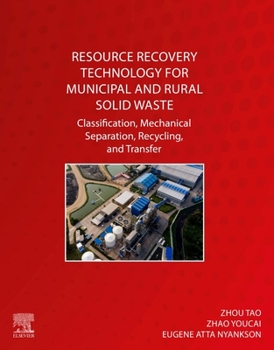Resource Recovery Technology for Municipal and Rural Solid Waste: Classification, Mechanical Separation, Recycling, and Transfer
Resource Recovery Technologies for Municipal and Rural Solid Waste: Classification, Mechanical Sseparation, Recycling, and Transfer describes the practical considerations in recycling of solid waste from source characterization to recycling of end product with the aim of maximizing pollution control and resource recovery. Topics covered include source classification models, solid waste treatment and resource recovery, integrated mechanical separation and parameter optimization, and the collection and transfer of classified domestic solid waste. The book goes into significant detail on each stage of the process including separation technologies according to the difference of particle size, material density difference, the difference in optical, electrical and magnetic effects of materials, preparation of plastic composites, and production of composite boards with organic waste from domestic solid waste. The evaluation of recyclable materials through analysis of solid waste components and separation characteristics will allow waste management practitioners to effectively implement recycling methods for mixed solid waste. The book also includes a thorough case study of success in solid waste management using these techniques in as an example of the application of these technologies.
Resource Recovery Technologies for Municipal and Rural Solid Waste details pollution control and resource recovery in every stage of municipal and rural solid waste management for solid waste engineers and environmental scientists, and academics and students in waste management.





